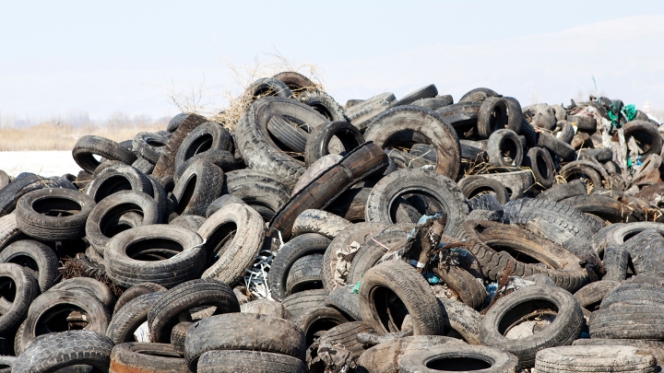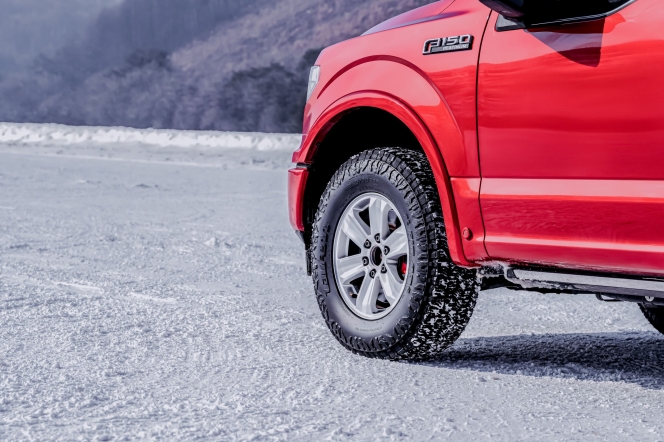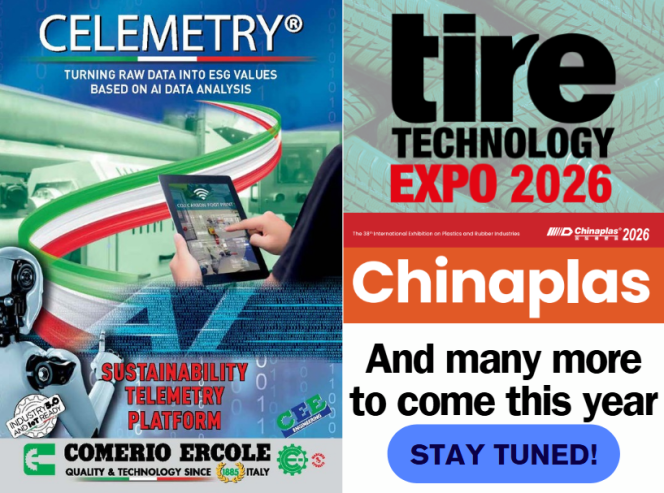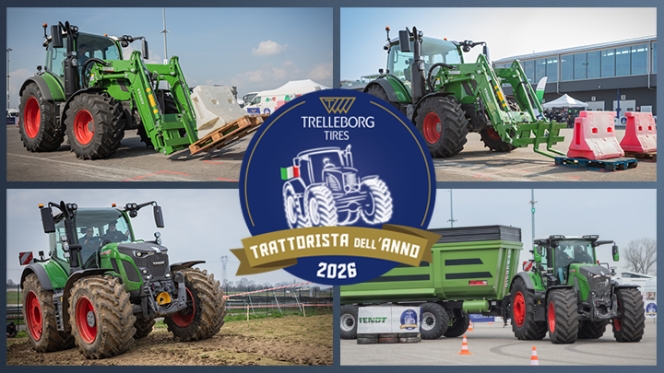Used Tyres Pose Environmental Threat in India, Sparking Call for Stricter Import Rules
- By TT News
- February 22, 2024

India’s used tyre industry is facing growing scrutiny, with concerns mounting over a surge of imports from developed nations like the United Kingdom. The Tyre Recovery Association (TRA) has joined forces with the Automotive Tyre Manufacturers’ Association (ATMA) to urge authorities to enforce stricter regulations on waste tyre exports, citing significant environmental and safety risks.
Data released by ATMA reveals a sharp increase in used tyre imports to India last year, with nearly 800,000 tonnes arriving between April and November 2023. With its reported 300,000 tonnes of annual exports, the UK is a significant source of these used tyres.
Industry experts warn that a significant portion of these imported tyres, estimated at 10-15 percent, are sold for reuse, raising concerns about their safety and quality. According to reports, the remaining majority are processed through outdated and polluting “batch-pyrolysis” methods. While legal, this practice falls under the “orange” category of India’s Central Pollution Control Board (CPCB) colour-coded system, just below the most hazardous “red” category.
The CPCB’s December 2023 report proposed the colour system as a tool to encourage cleaner technologies and stricter compliance. The TRA welcomes ATMA’s collaboration with the CPCB and the Ministry of Environment, Forest, and Climate Change. This joint effort aims to implement new regulations and address the environmental and safety challenges posed by the import and disposal of used tyres.
Peter Taylor OBE, Secretary General of the TRA, said, “This confirms our long-held suspicions and what many operators have been saying for a long time. While we are grateful to India’s Automobile Tyre Manufactures Association, people should be shocked at how their findings lay bare the inadequacy of the UK government’s response to TRA demands for tighter export controls. Now the Chair of the ATMA, Anshuman Singhania, is also calling for tyres to be size reduced before import to India (in UK terms shredded) to prevent their abuse by an onward market; perhaps the UK government can finally act to update the out of date and failing UK regulatory framework.”
“The British government should also listen to Prashanth Doreswamy, President and CEO, Continental Tire India, who has called for new regulations to be enacted in India to curtail the imports of waste tyres and allow only shred. There is no reason for the UK authorities to continue to dither; they should ensure we only export shredded tyres, grow our circular, environmentally responsible market and follow the very successful Australian example. ATMA has exposed the low standards of environmental practices which appear in some parts of their domestic industry. The evidence from them is clear: too many operators in the Indian onward market are not meeting the recognised environmental standards or their equivalence. It is time the UK government woke up and acknowledged that far from tackling this environmental assault, they are enabling UK operators to facilitate environmental harm. It is time the UK government does the right thing to help India stop these environmental abuses, as India’s manufacturers demand of us,” Taylor added.
- Yokohama Rubber
- Yokohama ADVAN Tyres
- Nürburgring 24-Hour Race
- Nürburgring Langstrecken-Serie
- BMW M Motorsport
Yokohama Becomes BMW M Motorsport’s Official Tyre Partner For 2026 Nürburgring Events
- By TT News
- March 03, 2026

The Yokohama Rubber Co., Ltd., has entered into a new agreement to serve as the official tyre supplier for BMW M Motorsport, the division responsible for the brand's global racing endeavours. This collaboration will debut at the prestigious Nürburgring 24-Hour Race and throughout the Nürburgring Langstrecken-Serie in 2026.
This renewed partnership revives a historical connection between the two companies, who previously worked together on the same iconic circuit from 1980 to 1990. During that initial decade-long stint, their combined efforts secured two overall victories. After an interval of nearly four decades, they are reuniting for the current season to compete in the premier SP9 class, fielding the BMW M4 GT3 EVO. For this campaign, Yokohama will equip the vehicle with its high-performance ADVAN racing tyres, with the shared objective of capturing another overall win.

Beyond its tie-up with the BMW team, Yokohama Rubber continues its longstanding commitment to the Nürburgring. It will provide its tyres to numerous leading teams contesting both the endurance series and the 24-hour event this season. The company is focused on achieving an overall championship victory for a vehicle equipped with its YOKOHAMA brand tyres.
Franciscus Van Meel, CEO, BMW M GmbH, said, “We are excited to welcome YOKOHAMA as Official Partner of BMW M Motorsport for our Nürburgring programme. YOKOHAMA’s technical expertise and motorsport passion strengthen our drive for maximum performance and precision. Their support allows our team to focus fully on what defines BMW M Motorsport: pushing the limits on every lap. We look forward to a strong endurance season.”
Team: Schubert Motorsport
Class: SP9
Car: BMW M4 GT3 EVO
Tyres:
ADVAN A005 (for dry conditions); Sizes: front 300/680R18, rear 330/710R18
ADVAN A006 (for wet conditions); Sizes: front 300/680R18, rear 320/710R18
Race Schedule (as of date of this release)
March 14 (Sat): NLS Round 1
March 21 (Sat): NLS Round 2
April 11 (Sat): NLS Round 3
April 18 (Sat) –19 (Sun): Nürburgring 24-Hour Race (Qualifiers) , NLS Rounds 4 & 5
May 14 (Thu) –17 (Sun): Nürburgring 24-Hour Race
June 20 (Sat): NLS Round 6
August 1 (Sat): NLS Round 7
September 12 (Sat) –13 (Sun): NLS Rounds 8 & 9
October 10 (Sat): NLS Round 10
Second-Generation Laufenn X FIT AT2 All-Terrain Tyre Launched In US
- By TT News
- March 03, 2026

Hankook Tire has introduced the Laufenn X FIT AT2, a new addition to its all-terrain tyre lineup aimed at drivers who require durability and adaptability without compromising on everyday driving comfort. Positioned as an affordable option, this tyre is engineered to handle a mix of on-road and off-road conditions while delivering long-lasting value.
Building upon the foundation of its predecessor, the X FIT AT2 brings several performance upgrades. It features enhanced traction across varied landscapes, a 15 percent improvement in tread longevity and reliable handling in different weather conditions. The tyre is designed to fit a broad spectrum of light trucks and SUVs, with availability ranging from 15 to 22 inches to accommodate popular vehicle models in the market.
This launch reflects Laufenn’s ongoing strategy to diversify its offerings as it strengthens its presence in over 100 countries. Since its introduction in Europe, the brand has consistently expanded its range for both passenger vehicles and commercial applications, responding to shifting consumer needs. The X FIT AT2 reinforces this direction by providing a balance of rugged capability and composed road manners for those who frequently transition between highways and rougher terrain.
Engineered for resilience, the tyre incorporates a reinforced structure, including select sizes with three-ply sidewalls to resist cuts and impacts. Its tread design features directional and lateral grooves that enhance water dispersion and grip on slippery or loose surfaces. Additional protective elements such as offset shoulder blocks and rim guards help shield against debris and curb damage. A two-step deep sipe pattern promotes uniform wear, contributing to extended usability.
Certified with the Three-Peak Mountain Snowflake symbol, the X FIT AT2 offers dependable performance in dry, wet and snowy winter conditions. It comes with warranty coverage tailored to its sizing, offering 60,000 miles for P-metric versions and 50,000 miles for LT-metric options. With this release, Laufenn continues to round out its portfolio alongside existing lines such as the S FIT, G FIT and I FIT series.
KC Jensen, Vice President – U.S. Passenger Car and Light Truck Sales, Hankook Tire America Corp, said, “The X FIT AT2 represents the next step forward for the Laufenn brand as we continue to deliver practical, dependable solutions for everyday drivers who also want the freedom to explore off-road. Building on the success of the original X FIT AT, this second-generation tyre offers a stronger blend of durability, versatility and everyday comfort at an accessible value.”
Comerio Ercole To Showcase Calendering And Digital Solutions At Two Premier 2026 Trade Fairs
- By TT News
- March 03, 2026

Comerio Ercole is set to make a significant impact on the global stage in 2026 with its participation in two major industry exhibitions. The company will showcase its latest advancements at both Chinaplas 2026 and Tire Technology Expo 2026, highlighting a comprehensive portfolio designed to enhance precision, productivity and sustainability in polymer processing.
At Tire Technology Expo, Comerio Ercole will present integrated systems tailored for the tyre industry, focusing on high-performance rubber calendering and digital intelligence. A flagship solution is the TRIPLE 4-roll calendering unit. Its innovative "S" configuration provides remarkable flexibility by enabling the processing of both textile and steel cord, as well as the production of rubber sheeting, all within a single line. The system’s capability for simultaneous lamination ensures high precision and product stability while minimising defects. Downtime is a critical factor in tyre production, and the patented FASTEEL system directly addresses this. By automating the steel cord change process, it dramatically reduces changeover time from hours to minutes, allowing the line to continue running during preparation and thereby maximising plant availability and operator safety. Following the calendering process, the SUPERCUT system guarantees clean, precise transversal cuts for both steel and textile-reinforced rubber, integrating guillotine and high-speed rotary blades to minimise waste and streamline downstream winding.
Simultaneously, at Chinaplas 2026, taking place in Hall 2.1 at Stand C85, the company will place a strong emphasis on its patented HYDROPLUS concept for PVC and plastic calendering. This technology suite is engineered to deliver micrometric precision and robust process stability through advanced hydraulic controls. Central to this is HYDROGAP, a system that achieves exceptional thickness uniformity with high-resolution gap positioning. Complementing this are HYDROSAFE, which ensures rapid roll separation for ultimate protection, and HYDROTHERM, a feature that intelligently compensates for thermal expansion to maintain precise gap settings during fluctuating operational temperatures.
Beyond mechanical innovation, the company is driving digital transformation with its CELEMETRY and MINERV-AI platforms. CELEMETRY focuses on sustainability by converting production data into actionable insights for environmental reporting and energy optimisation. MINERV-AI captures and standardises operational expertise through artificial intelligence, supporting more effective maintenance protocols, training procedures and overall operational consistency. Through these combined efforts at both exhibitions, Comerio Ercole is demonstrating a holistic approach to advancing the plastics, rubber and tyre industries.
Trelleborg Tires And Fendt Partner For 2026 Tractor Driver Of The Year Event
- By TT News
- March 02, 2026

The seventh edition of Trelleborg Tires’ Tractor Driver of the Year competition took place at the Cremona Circuit in Italy on 28 February 2026, drawing 50 skilled participants from across the nation. Held at a venue renowned for its professional standards, the event has become a fixture in the agricultural calendar, offering a platform for drivers to demonstrate their expertise while experiencing advanced tyre technology in practical scenarios. After a demanding day of challenges, Francesco Coppe emerged victorious, distinguished by his exceptional precision and versatility across the various disciplines.
The competition featured a series of exercises designed to assess core abilities, including manoeuvring, loader operation, reverse driving and trailer handling, culminating in a field regularity test. Throughout these tasks, participants directly observed the benefits of Trelleborg’s ProgressiveTraction technology, which aims to boost traction, reduce soil impact and enhance overall efficiency. This year, Fendt joined as the technical partner, supplying the machinery for the event. The tractors used, such as the Fendl 300 Vario Gen5, 500 Vario Gen4 and 800 Vario Gen5 models introduced in 2025, exemplified how modern agricultural engineering supports operators in achieving high performance with comfort and ease, both on road and in the field.


Daniela Gambatesa, Marketing Manager Italy, Trelleborg Tires, said, “The ‘Tractor Driver of the Year’ once again confirms its position as a landmark event for the agricultural sector: a unique opportunity to celebrate expertise, innovation and professionalism. This 7th edition recorded a remarkable participation of tractor drivers, highlighting the growing importance of the initiative. A key highlight of the event was the new ‘5,000 Hours of Guaranteed Performance’ campaign dedicated to ProgressiveTraction® treads, originally launched in July 2025 and now featuring a customised look for Fendt tractors equipped with VarioDrive technology. This initiative allows us to prove in real working conditions the long-term durability and efficiency of our tyres, offering tangible support to agricultural professionals in their daily operations. The collaboration with Fendt as technical partner further reinforces our shared commitment to excellence, combining advanced technology with high-performing solutions for the industry.”
Silvia Uderzo, Advertising & Sales Promotion Specialist, Fendt Italia, said, “Fendt has believed in the ‘Tractor Driver of the Year’ project since its early editions, reflecting the trust and importance we attribute to this initiative. Taking part again this year represents a valuable opportunity to enhance the skills of tractor drivers and to demonstrate how the technology, performance and comfort of our machines play a decisive role in improving operational efficiency. The partnership with Trelleborg Tires confirms our shared commitment to delivering increasingly high-performing and sustainable solutions to agricultural professionals, combining innovation with close attention to their real operational needs.”







Comments (0)
ADD COMMENT